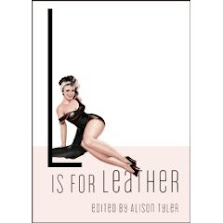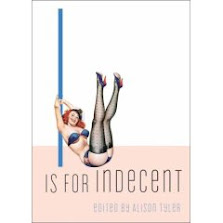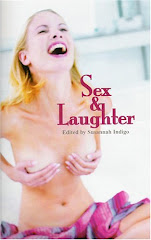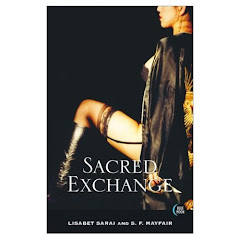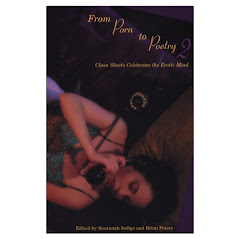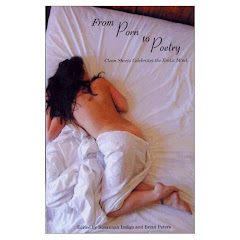Enjoy
To Boldly Cliché
© Mike Kimera 2011
“Is that the Cliché Guy?” I asked Molly.
“Yeh. I told you he was hot. Wait 'til you hear the Brit accent. He could read my grocery list aloud and make it sound sexy. When he reads from his erotica stuff I turn into a puddle."
I'd let Molly drag me along to her Creative Writing class to see her latest lust object, partly so I could get her to shut up about him and partly because the title of the lecture intrigued me: “To Boldly Cliché – going where other writers fear to tread.” I'd heard a lot of clichéd lectures in my time, but I'd never known a lecturer who advertised that they were doing it on purpose.
“So,” Molly said, almost fizzing with excitement. “Waddaya think of him?”
She was right of course, he was hot. But I wasn't going to give that to her straight away. Besides, there was something off about the guy; something that wasn't what it seemed; something that was maddeningly familiar but which I couldn't name.
“Well, he certainly looks like a cliché. I'd say he's playing tall dark handsome stranger, pretending to be an academic.”
“You think the geek-glasses are fake?”
“Well, even if they're real, the tweed jacket with patches on the elbows is way too 'central casting' to be authentic, even for a Brit.”
Molly didn't look pleased at my description, so I threw in a rider: “The jacket does fit him rather well though doesn't it?”
Molly smiled, leaned towards me conspiratorially and said, “A body like that would look good in anything. Personally, I'm imagining a thong and a tan. ”
I laughed. People turned to look, including Cliché Guy.
When his eyes found us, Molly pretended to be looking for something in her bag. I met his gaze. Behind those ugly glasses, he had beautiful eyes. He raised one eyebrow, gave a hint of a smile, as if we shared a secret and then turned back to his notes.
Not here five minutes and already I was living a cliché; our gazes meeting across a crowded room creating a small bubble of intimacy between two strangers, followed by my heart going all pit-a-pat. And all for a strange guy in glasses.
Suddenly I knew who Cliché Guy was pretending to be; he was Clarke Kent all dressed up to give a lecture. Did that mean he was Superman underneath?
Sheash, it had been hard enough to concentrate when I had Molly's thong image in my head, now I was seeing the guy ripping his shirt open to show me his big S.
I was about to share this idea with Molly when Cliché Guy started to talk.
“Good evening, everyone. I'm Toby Lambert-Bryce and I'm here to tell you about the joy of clichés”
Toby Lambert-Bryce? He had to have made that up. What kind of a parent lands their child with a name like Toby? And was I the only one with traumatised flash-backs to those drawings of the creepy guy in the beard in my mother's dog-eared copy of 'The Joy of Sex'?
Apparently I was. Everyone else was listening to Toby.
“Cliché is actually onomatopoeic. Back in the days when moveable type was set by hand, it made sense to pre-set the most commonly used phrases into metal blocks of type that could be dropped into the metal matrix rather than build them letter by letter each time. French typesetters named these pre-set blocks after the noise they made as they slotted into the matrix – cliché .
"The typesetters literally knew how many clichés a writer dropped into their text. It's a talent many editors would benefit from today.”
He waited half a beat for laughter but none came. I figured he'd lost them at onomatopoeic – which sounded like the kind of volcanic island where Fay Wray gets up close and personal with King Kong. Still, I liked the way he said cliché – with the French accent and a lot of passion.
Addams Family flash: “Ah, Tish. You spoke French”. Now I knew why Gomez reacted like that. It was definitely sexy.
I shifted in my seat to catch Toby's attention, then I gave him my best 'You're doing great and I'm so supportive' smile.
“It's tempting to dismiss clichés as the sign of lazy thinking but I believe that would be a mistake. Clichés are the thread from which we weave our understanding of the world. As the much maligned Samuel Goldwyn once said, 'What we need is new clichés'.”
Again, no laughter. Not even when he used an accent for Samuel Goldwyn's words. I looked around to see why this was a such a tough house. Then I realised that the group was mainly female and mid-thirities and up and they weren't really listening to him because they were too busy eating him with their eyes. Poor old Toby had just been dropped into SPECTRE's piranha tank and hadn't even noticed yet.
“Clichés are the genes in the metaphorical DNA of our collective subconscious. They are short pieces of code that hold a meaning we all take for granted, so much so, that we have trouble seeing the cliché itself. Clichés evolve from the discourse we hold with ourselves as a society. I believe that clichés are best understood as organisms that have a life-cycle.”
At this point two things happened, Toby started to give his talk directly to me, as I seemed to be the only one reacting to his content (or because he'd fallen madly in love with me the moment our eyes met across a crowded room – yeah, right), and I began to be distracted by what he was saying. It was a bit too dressed-up for its own good but it made sense to me.
“Clichés start life, in their larval state as it were, as insights. Ways of seeing that are at once so distinctive and so accurate that everyone goes 'ah ha, that's what I meant' or 'of course it is so'. “
Of course it is so? Who says that out loud? Toby desperately needed a translator if he was going to get his message across to Earthlings.
“It is the originality and accuracy of the cliché that results in its widespread use and takes it to the next stage of its life-cycle. The more the cliché is used, the less it is really seen. Its impact is blunted. Its meaning is not lost, but rather is taken for granted. The cliché becomes part of our collective gestalt. It sets our expectations about the truth a writer is describing. It is the establishing shot in the movie, the leitmotiv in the opera, the three basic chords in a Status Quo song. Without clichés, originality would have no place to live.”
I waited for the applause. Anyone who can build Status Quo into a creative writing lecture deserves applause. None came.
“Do you understand what he's saying?” I whispered to Molly.
“Not a word. But I love the way that he says it. Except, what was with the German accent. Is he faking the Brit thing or what.”
“Gestalt and leitmotiv are German words.”
“Well I knew they weren't English. You'd think he'd use English in a creative writing class, wouldn't ya?”
Molly always makes me smile. She puts the dumb act on of course. She thinks it makes her less threatening to men. I think it makes her so non-threatening that they wipe their fit on her as they walk out of her bedroom but I try not to say that out loud.
Toby was still talking but, like everyone else, I wasn't listening any more. I was watching him remove that horrible Tweed jacket. The shirt underneath fitted him even better than the jacket had. Broad shoulders, narrow waist, hips a teen model would kill for but best of all, when he turned around to hang up his jacket we all got a view of his tight, chino-clad butt. He even managedto make Dockers look good.
“The final stage of the cliché life-cycle comes when it is so over-used that it loses its authenticity, its meaning changes and it becomes either a parody of itself, a source of humour, a sort of Quixotic metaphor that once slew dragons and now tilts only at windmills or it becomes its own shadow and is used to undermine the truth it was once a token of.”
He smiled when he finished that sentence. He shouldn't have smiled. He's lost everyone in the room. He should have been feeling at least disappointed if not anxious. There was something else going on here.
I leaned forward to give him my full attention and tried to ignore Molly saying, “Are you starting to drool over him?”
I'd answer that question when I'd worked out the puzzle.
“I'm here today to ask you, as writers, to intervene in the cliché life-cycle. To do a bit of genetic engineering if you will. Don't bury clichés in the literary landfill; recycle them. Look into the heart of what made the cliché distinctive and insightful. Sharpen the blunt edges. Scrape off the cultural barnacles and find the metal underneath.”
Toby was looking at me now. That hint of a smile was back. I was sure that this was a clue to whatever was going on here.
“Sometimes all it takes is to update one small part of the cliché. Ripley in 'Alien' spawned a whole new trope of kick-ass female warriors. The part was originally written for a man. If it had been played by a man, would we have really seen, Ripley? Once the director cast Sigourney Weaver, the edges of the cliché became so sharp they cut themselves a niché in our collective imaginations.”
Ah, now things were getting clearer. I started to see what Toby was up to.
“Sometime a cliché can be used to bait-and-switch the audience towards a new truth. Start with the happy couple clichés: meeting, fighting, reconciling, marrying – but add in some serial-killer secret-identity clichés for one or both of the couple and you have yourself a 'Prittzi's Honor' or a 'Mr. and Mrs. Smith.'.”
That's when I finally understood what Toby was doing. Even without seeing him in a thong I knew for sure now that the guy had balls.
“In closing, I'd ask all of you to boldly cliché in your work. I assure you, you will be writing at the final frontier. I hope you enjoyed the show folks. Have a great evening.”
There was spatter of applause, then Toby put his jacket back on and people started to file out.
“Wait for me at the door,” I said to Molly, “I'd like a word with Toby.”
“I thought you would.”
Like I said, Molly only pretends to be dumb.
Toby waited for me. He looked relaxed and amused. He had every right to be.
“So, does the college know what you're doing?” I said,
“That I'm giving a Creative Writing Class on clichés? Sure.”
The Brit accent was gone now, but the smile was still there.
“But they don't know about your Performing Arts project?”
“No, Professor, they don't.”
“You recognised me?”
“As soon as you came in. I took your class on the need for a return to narrative at UCLA. You were the hottest prof I'd ever met.”
He took off the geek-glasses. His eyes were a startlingly deep blue.
“I don't remember you.”
“Tragic isn't it?”
I was thinking more that not noticing him might have saved me from a serious breach of professional ethics.
“And now you're doing a Masters in Performance Art?”
“Yes. This is part of my thesis work.”
“And what is your thesis?”
“I'm exploring the role of cliché in dissemblance. The creation of an unreliable narrator that everyone thinks is reliable at first because it's so clichéd they don't assess it.”
“The bait-and-switch?”
“Exactly. My contention is that people always believe the body language regardless of the words.”
For the first time he gave me a full wattage smile. My body was telling me that it wanted to speak his language. I ignored it and tried to stay on topic.
“And you have all this on film so that you can analyse the reaction of the audience to the different clichés you present them with?”
“Yes, with the college's permission of course.”
There was a pause in which a great deal was not said.
“Would it be too clichéd if I asked you to come and have coffee with me?” he said.
My heart did a back-flip and I had to struggle to prevent myself from grinning like an idiot.
“Well,” I said, “I'll agree on one condition.”
“What's that?”
“Open your shirt and show me what you're wearing underneath.”
“Hah, I didn't think you'd spot that.” he said as he unbuttoned his blue Oxford-weave button-down to reveal a Super Man T-shirt.
“There's a Starbucks around the corner,” I said, linking my arm through his.
As we walked towards the door, Molly gave me an evil grin, waived and left



